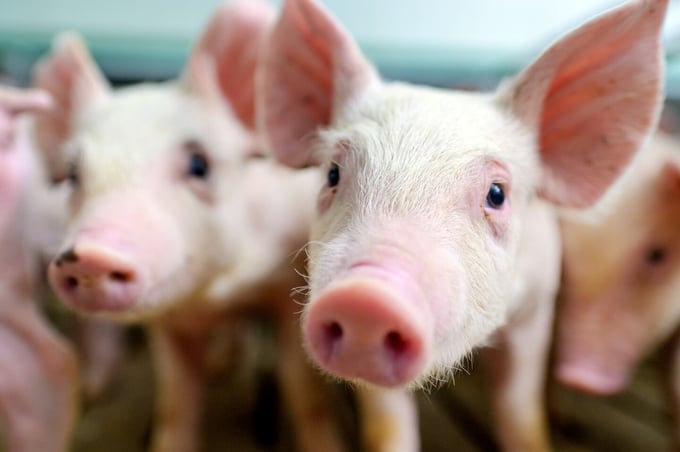November 27, 2025 | 01:07 GMT +7
November 27, 2025 | 01:07 GMT +7
Hotline: 0913.378.918
November 27, 2025 | 01:07 GMT +7
Hotline: 0913.378.918

Pigs are being genetically modified to help prevent disease in them. Photo: Adobe.com
Pork has long been a staple in dinners worldwide. Used in soups, sandwiches and more dishes, it would be hard to imagine a world without pork. But with diseases ravaging the pork industry, a company in the U.K. is hoping to change that by genetically modifying pigs that are meant for human consumption.
According to Smithsonian Magazine, a disease known as porcine reproductive and respiratory syndrome, or PRRS, costs the U.S. pork industry almost half a billion dollars annually.
Also known as blue ears disease, it causes pneumonia symptoms in baby pigs, reproductive failure in adult females and weakens their immune systems overall, per Smithsonian Magazine.
While there are vaccines against PRRS, they are only able to reduce symptoms, and antibiotics used to treat a pig’s weakened immune system can “exacerbate the development of other resistant bacterial diseases,” per Popular Science.
In order to fight back against PRRS, a company in the U.K. is genetically modifying pigs’ genes to make them more resistant to the disease.
A company called Genus released a new study where they modified the gene CD163 to make it resistant to the disease PRRS.
Using a technology that edits genes known as CRISPR, Genus modified the gene CD163 within four pigs and transferred them to reproductive female pigs, creating a new generation of pigs with more resistance to PRRS, per Smithsonian Magazine.
But the modification process actually started eight years ago at the University of Missouri with a team led by Randall Prather. Researchers believed that disabling a receptor on the gene CD163 could make pigs resistant to PRRS, according to Popular Science. CD163 is a cell that is often used by viruses to start an infection.
According to Smithsonian Magazine, it’s going to take several years until farmers will have fully resistant pigs. The company Genus is currently seeking FDA approval for the genetically modified pigs.
Until that occurs, it will be a few years until we’ll possibly see the new genetically modified pork on our dinner plates.
(Deseret)

(VAN) A new study reveals how the simultaneous effects of ocean acidification, salinity and loss of oxygen are making the world more fragile.

(VAN) Hopes are growing that the creation of the first 3D turkey gut model could be a turning point in the battle against the virulent blackhead disease.

(VAN) Tyson, America’s biggest meat supplier, plans to shutter one of its largest beef processing plants as the industry continues to struggle with low cattle supplies and political pressure from Washington.

(VAN) New FAO study shows how digital solutions are empowering farmers and fishers to prevent losses and build resilient agrifood systems.

(VAN) Brazil's COP30 presidency pushed through a compromise climate deal on Saturday that would boost finance for poor nations coping with global warming but that omitted any mention of the fossil fuels driving it.

(VAN) Poultry farmers in the UK have been warned that they could face one of the worst winters yet for bird flu.

(VAN) Prices of main-crop paddy have risen sharply, with jasmine rice hitting 16,100 baht per tonne — the highest level in years.